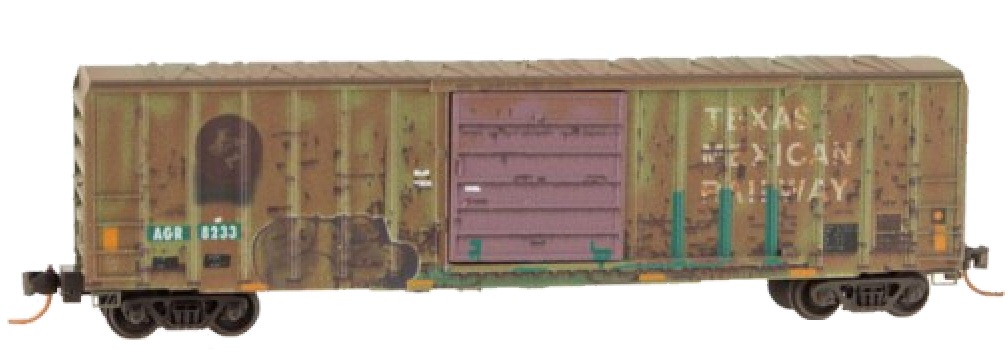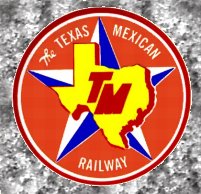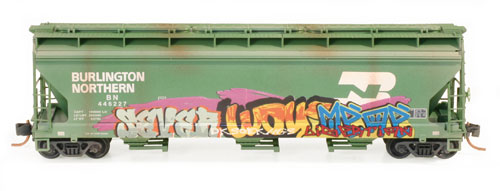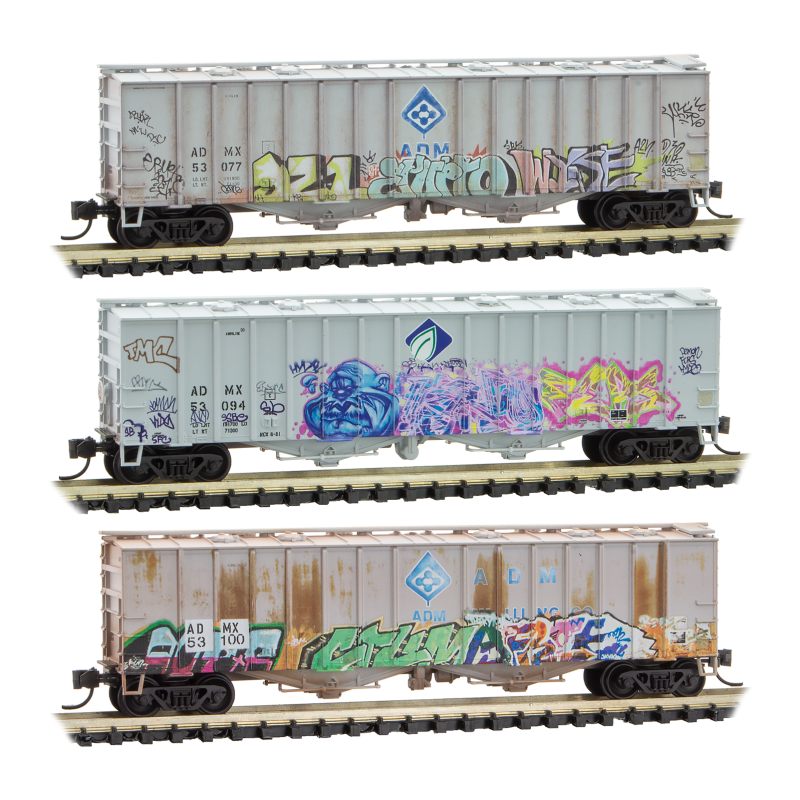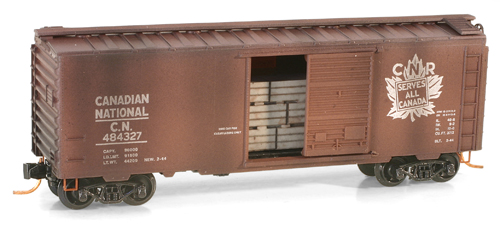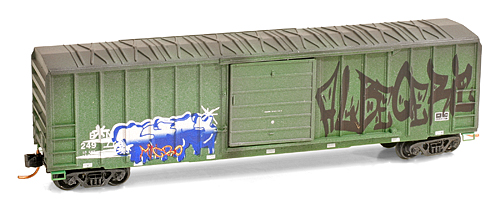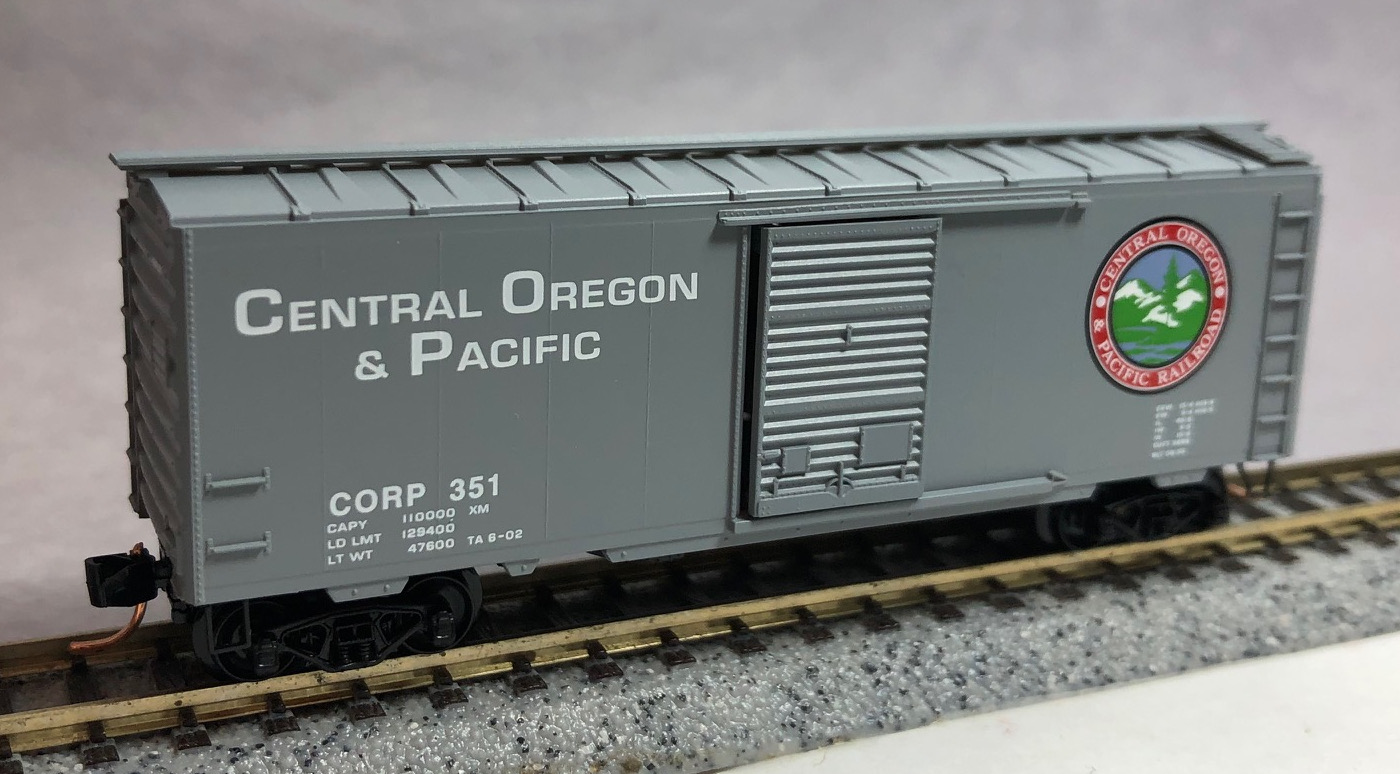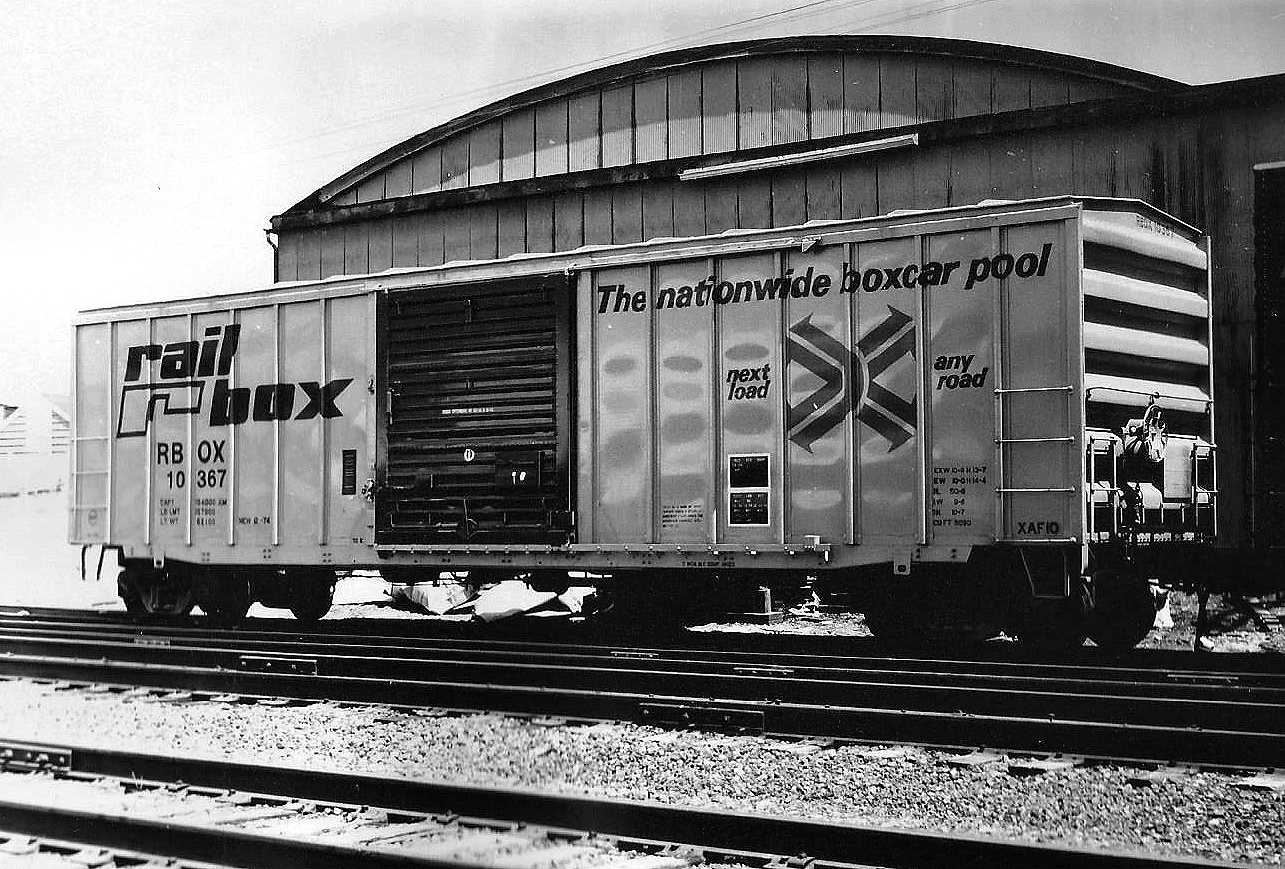Model Information: This model was first produced by Kadee in February of 1981. It is a model of a 50 Foot Steel Rib-Side Single Sliding Door Boxcar. Specifically, this Micro-Trains body style models the FMC 50' 5077 Single Sliding Door prototype. It is also used by Micro-Trains to model Pullman Standard 50' boxcars. Hence on some releases, this car is labeled as a Pullman Standard and in other cases it is labeled as an FMC boxcar, and it also is frequently labeled as a '50' Rib Side Box Car[sic]' with no mention of prototype whatsoever. It appears to be closest to the FMC 5077 boxcar prototype (from the 1970s) in any event. These models can appear with any one of multiple different sliding door types. The doors for this model are operating ones (cool!).
Prototype History: In the 1970's with the growth of the Per Diem business model, FMC produced a series of 50 foot box cars in different configurations. The single-sliding-door configuration is one of the best known and used widely by many different railroads. These cars were produced using the Gunderson metal works which FMC had acquired in 1965. In late 1975, FMC began producing a 5,077-cubic-foot Plate B box car for IPD and Railbox service. FMC's 5077s have seven panels to either side of the 10-foot door, an X-panel roof, and non-terminating ends that are slightly different from those used on FMC's earlier cars. Note how the sidesill is notched all the way back to the bolsters, a key feature of FMC's mature design.
The main difference between the 5077 cu. ft cars built by FMC vs the 5277-5347 cu. ft cars built by the same manufacturers is the overall height of the car, the smaller 5077 cars were Plate B while the larger 5277-5347 cars were Plate C. Over 4,300 cars were produced from 1975-1979 by FMC's Portland, Oregon plant. The cars were delivered in numerous colorful shortline paint schemes, as well as the nationwide car pool fleet of Railbox. Many secondhand cars were later seen in Class 1 railroads and large leasing company fleets under additional shortline reporting marks.
The main difference between the 5077 cu. ft cars built by FMC vs the 5277-5347 cu. ft cars built by the same manufacturers is the overall height of the car, the smaller 5077 cars were Plate B while the larger 5277-5347 cars were Plate C. Over 4,300 cars were produced from 1975-1979 by FMC's Portland, Oregon plant. The cars were delivered in numerous colorful shortline paint schemes, as well as the nationwide car pool fleet of Railbox. Many secondhand cars were later seen in Class 1 railroads and large leasing company fleets under additional shortline reporting marks.
Road Name History: The Texas Mexican name first appeared in 1881 during a reorganization of a previous three foot gauge line linking the Gulf port of Corpus Christi, Texas and the city of Loredo on the Mexican border. The line was 157 miles long putting it between Spokane International and Duluth Winnipeg & Pacific in relative size. The TM was standard-gauged in 1902.
Since 1900, TM was owned by the Mexican government through a trust administered in New York. The TM acted as a funnel for traffic to and from Mexico, in fact the end of the line was half way across a bridge over the Rio Grande west of Loredo. The bridge, which was completed in 1883 was the first direct railroad connection between the U.S.A. and another country (the first connection to Canada that didn’t involve a ferry followed six years later!)
TM completely dieselized in 1939 with a fleet of 7 Whitcomb boxcabs. These strange little diesels had four axels set in a rigid frame. That sounds a little, well rigid, by diesel standards but think of it as a diesel powered 0-8-0. A few years later, TM built a few diesels themselves with 4 powered axels in a rigid frame plus a pair of un-powered leading wheels – essentially a diesel 2-8-0. They even built another diesel from an old baggage car.
TM did go on to buy more sensible locomotives including Baldwin switchers, EMD F7’s, and 7, 9, 18, 28, and 38 series geeps. By the 1980’s, there were 16 various geeps on the roster. For a while in the 1980s, TM provided passenger service under the name TexMex Express between Corpus Christi and Loredo with some success.
In 1982, the Mexican government sold their stake in TM to a Mexican company. As the privatization of the Mexican National Railways (FNM) loomed, Kansas City Southern was assembling a system to take advantage of new traffic moving north and south due to the passage of the NAFTA treaty. KCS was positioning itself to acquire a large stake in the “Northeast Concession” (that would become TFM) in the privatization of FNM. Over a period of several years, shares in Texas Mexican were traded back and forth between KCS and companies in Mexico. KCS officially took control of TM in 2005 when they also purchased all remaining shares of TFM. That left a gap between Corpus Christi and the end of the KCS at Beaumont, Texas. KCS had already leveraged trackage rights over Union Pacific to bridge that gap in exchange for not fighting UP’s acquisition of Southern Pacific. Today, TM is a wholly owned subsidiary of KCS and operations are largely integrated into those of KCS.
Since 1900, TM was owned by the Mexican government through a trust administered in New York. The TM acted as a funnel for traffic to and from Mexico, in fact the end of the line was half way across a bridge over the Rio Grande west of Loredo. The bridge, which was completed in 1883 was the first direct railroad connection between the U.S.A. and another country (the first connection to Canada that didn’t involve a ferry followed six years later!)
TM completely dieselized in 1939 with a fleet of 7 Whitcomb boxcabs. These strange little diesels had four axels set in a rigid frame. That sounds a little, well rigid, by diesel standards but think of it as a diesel powered 0-8-0. A few years later, TM built a few diesels themselves with 4 powered axels in a rigid frame plus a pair of un-powered leading wheels – essentially a diesel 2-8-0. They even built another diesel from an old baggage car.
TM did go on to buy more sensible locomotives including Baldwin switchers, EMD F7’s, and 7, 9, 18, 28, and 38 series geeps. By the 1980’s, there were 16 various geeps on the roster. For a while in the 1980s, TM provided passenger service under the name TexMex Express between Corpus Christi and Loredo with some success.
In 1982, the Mexican government sold their stake in TM to a Mexican company. As the privatization of the Mexican National Railways (FNM) loomed, Kansas City Southern was assembling a system to take advantage of new traffic moving north and south due to the passage of the NAFTA treaty. KCS was positioning itself to acquire a large stake in the “Northeast Concession” (that would become TFM) in the privatization of FNM. Over a period of several years, shares in Texas Mexican were traded back and forth between KCS and companies in Mexico. KCS officially took control of TM in 2005 when they also purchased all remaining shares of TFM. That left a gap between Corpus Christi and the end of the KCS at Beaumont, Texas. KCS had already leveraged trackage rights over Union Pacific to bridge that gap in exchange for not fighting UP’s acquisition of Southern Pacific. Today, TM is a wholly owned subsidiary of KCS and operations are largely integrated into those of KCS.
Brand/Importer Information: Micro-Trains is the brand name used by both Kadee Quality Products and Micro-Trains Line. For a history of the relationship between the brand and the two companies, please consult our Micro-Trains Collector's Guide.
Manufacturer Information:  Micro-Trains Line split off from Kadee Quality Products in 1990. Kadee Quality Products originally got involved in N-Scale by producing a scaled-down version of their successful HO Magne-Matic knuckle coupler system. This coupler was superior to the ubiquitous 'Rapido' style coupler due to two primary factors: superior realistic appearance and the ability to automatically uncouple when stopped over a magnet embedded in a section of track. The success of these couplers in N-Scale quickly translated to the production of trucks, wheels and in 1972 a release of ready-to-run box cars.
Micro-Trains Line split off from Kadee Quality Products in 1990. Kadee Quality Products originally got involved in N-Scale by producing a scaled-down version of their successful HO Magne-Matic knuckle coupler system. This coupler was superior to the ubiquitous 'Rapido' style coupler due to two primary factors: superior realistic appearance and the ability to automatically uncouple when stopped over a magnet embedded in a section of track. The success of these couplers in N-Scale quickly translated to the production of trucks, wheels and in 1972 a release of ready-to-run box cars.
Micro-Trains Line Co. split off from Kadee in 1990 to form a completely independent company. For this reason, products from this company can appear with labels from both enterprises. Due to the nature of production idiosyncrasies and various random factors, the rolling stock from Micro-Trains can have all sorts of interesting variations in both their packaging as well as the products themselves. When acquiring an MTL product it is very important to understand these important production variations that can greatly enhance (or decrease) the value of your purchase.
Please consult our Micro-Trains Collector's Guide

Micro-Trains Line Co. split off from Kadee in 1990 to form a completely independent company. For this reason, products from this company can appear with labels from both enterprises. Due to the nature of production idiosyncrasies and various random factors, the rolling stock from Micro-Trains can have all sorts of interesting variations in both their packaging as well as the products themselves. When acquiring an MTL product it is very important to understand these important production variations that can greatly enhance (or decrease) the value of your purchase.
Please consult our Micro-Trains Collector's Guide
Item created by: gdm on 2016-02-01 13:40:36. Last edited by CMK on 2020-06-22 09:48:45
If you see errors or missing data in this entry, please feel free to log in and edit it. Anyone with a Gmail account can log in instantly.
If you see errors or missing data in this entry, please feel free to log in and edit it. Anyone with a Gmail account can log in instantly.


